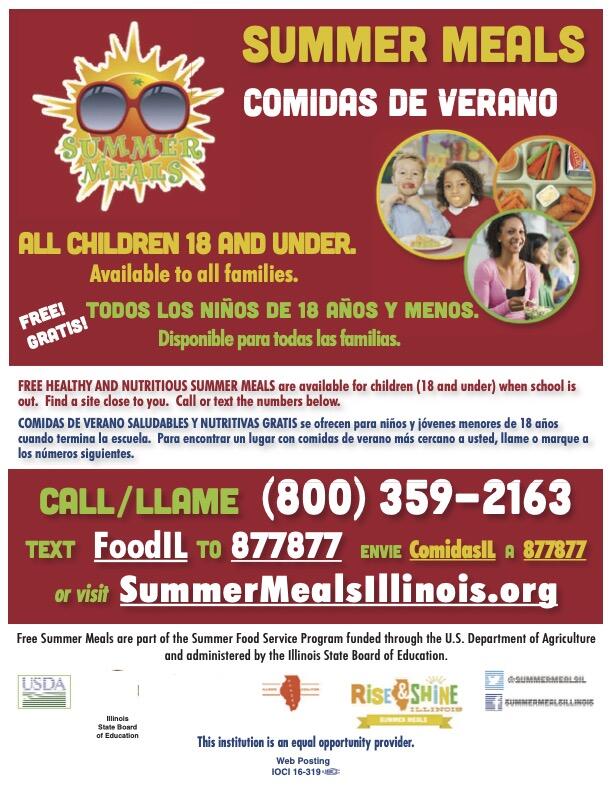Food Services
APPLICATION FOR FREE AND REDUCED LUNCH PROGRAM
Click here for information on how to apply for the free and reduced lunch programs.
FOOD ALLERGY INFORMATION
MONTHLY MENUS
2nd Option Menu (May change without notice depending on delivery of products)
INFO FROM THE CAFETERIA:
Teachers will take and submit orders for food and drinks in the morning. There is no changing the order after it has been submitted.
All lunch meals come with a main entree, fruit, vegetable and milk for $4.55. You can find the menu on our website.
Milk can also be purchased separately for $.60.
For questions on the hot lunch program contact
Lisa Honaker at lhonaker@winfield34.org
YOU CAN PAY THREE WAYS FOR LUNCHES
1. Pay through our website
Go to our the home page on our Website. Go to Fees. Go to Lunch Payments. Pay by credit card. There is no fee for using our website. Winfield District 34 Web Store
2. Meal Time Information
Signing In
www.mymealtime.com is the gateway to your student's cafeteria accounts. A MealTime Online account allows you to make a deposit into your student's MealTime account, or simply view your child's lunchtime purchases.
Mealtime is only used for online deposits. Credit card companies will sometimes charge a free for their service.
Information about the Mealtime app is now available here.
3. Pay By Check
If you are depositing money in to your account using a check, please address the check to Winfield School District 34. There is no fee when sending in a check or cash with your student. Checks can be turned in at either school office. If you have any questions, please contact Lisa Honaker at 630-909-4905.

SCHOOL WELLNESS POLICY
6:50 School Wellness
Student wellness, including good nutrition and physical activity, shall be promoted in the District’s educational program, school-based activities, and meal programs. This policy shall be interpreted consistently with Section 204 of the Child Nutrition and WIC Reauthorization Act of 2004 and the Healthy Hunger-Free Kids Act of 2010 (HHFKA).
The Superintendent will ensure:
- Each school building complies with this policy;
- The policy is available to the community on an annual basis through copies of or online access to the Board Policy Manual; and
- The community is informed about the progress of this policy’s implementation. Goals for Nutrition Education and Nutrition Promotion.
The goals for addressing nutrition education and nutrition promotion include the following:
Schools will support and promote sound nutrition for students.
Schools will foster the positive relationship between sound nutrition, physical activity, and the capacity of students to develop and learn.
Nutrition education will be part of the District’s comprehensive health education curriculum. See Board policy 6:60, Curriculum Content.
Goals for Physical Activity
The goals for addressing physical activity include the following:
Schools will support and promote an active lifestyle for students.
Physical education will be taught in all grades and shall include a developmentally planned and sequential curriculum that fosters the development of movement skills, enhances health-related fitness, increases students’ knowledge, offers direct opportunities to learn how to work cooperatively in a group setting, and encourages healthy habits and attitudes for a healthy lifestyle. See policies 6:60, Curriculum Content and 7:260, Exemption from Physical Education.
During the school day, all students will be required to engage in a daily physical education course, unless otherwise exempted. See policies 6:60, Curriculum Content and 7:260, Exemption from Physical Education.
The curriculum will be consistent with and incorporate relevant Illinois Learning Standards for Physical Development and Health as established by the Ill. State Board of Education (ISBE).
Nutrition Guidelines for Foods Available During the School Day; Marketing Prohibited
Students will be offered and schools will promote nutritious food and beverage choices during the school day that are consistent with Board policy 4:120, Food Services (requiring compliance with the nutrition standards specified in the U.S. Dept. of Agriculture’s (USDA) Smart Snacks rules).
In addition, in order to promote student health and reduce childhood obesity, the Superintendent or designee shall:
INSTRUCTION
6:50
1of3
6:50
-
Restrict the sale of competitive foods, as defined by the USDA, in the food service areas during meal periods;
-
Comply with all ISBE rules; and
-
Prohibit marketing during the school day of foods and beverages that do not meet the standards listed in Board policy 4:120, Food Services, i.e., in-school marketing of food and beverage items must meet competitive foods standards.
Competitive foods standards do not apply to foods and beverages available, but not sold in school during the school day; e.g., brown bag lunches, foods for classroom parties, school celebrations, and reward incentives.
Exempted Fundraising Day (EFD) Requests
All food and beverages sold to students on the school campuses of participating schools during the school day must comply with the “general nutrition standards for competitive foods” specified in federal law.
ISBE rules prohibit EFDs for grades 8 and below in participating schools. Guidelines for Reimbursable School Meals
Reimbursable school meals served shall meet, at a minimum, the nutrition requirements and regulations for the National School Lunch Program and/or School Breakfast Program.
Unused Food Sharing Plan
In collaboration with the District’s local health department, the Superintendent or designee will:
-
Develop and support a food sharing plan(Plan)for unused food that is focused on needy students.
-
Implement the Plan through out the District.
-
EnsurethePlancomplieswiththeRichardB.RussellNationalSchoolLunchAct,aswellas accompanying guidance from the U.S. Department of Agriculture on the Food Donation Program.
-
Ensurethatanyleftoverfooditemsareproperlydonatedtocombatpotentialfoodinsecurityin the District’s community. Properly means in accordance with all federal regulations and State and local health and sanitation codes.
Monitoring
At least every three years, the Superintendent shall provide implementation data and/or reports to the Board concerning this policy’s implementation sufficient to allow the Board to monitor and adjust the policy (a triennial report). This triennial report must include without limitation each of the following:
An assessment of the District’s implementation of the policy
The extent to which schools in the District are in compliance with the policy
The extent to which the policy compares to model local school wellness policies A description of the progress made in attaining the goals of the policy
How the District will make the results of the assessment available to the public Where the District will retain records of the assessment
6:50
2of3
6:50
The Board will monitor and adjust the policy pursuant to policy 2:240, Board Policy Development. Community Involvement
The Board and Superintendent will actively invite suggestions and comments concerning the development, implementation, periodic reviews, and updates of the school wellness policy from parents, students, representatives of the school food authority, teachers of physical education, school health professionals, the school board, school administrators, and the community. Community involvement methods shall align their suggestions and comments to policy 2:140, Communications To and From the Board and/or the Community Engagement subhead in policy 8:10, Connection with the Community.
Recordkeeping
The Superintendent shall retain records to document compliance with this policy, the District’s records retention protocols, and the Local Records Act.
LEGAL REF.:
Pub. L. 108-265, Sec. 204, Child Nutrition and WIC Reauthorization Act of 2004. 42 U.S.C. §1771 et seq., Child Nutrition Act of 1966.
42 U.S.C. §1751 et seq., National School Lunch Act.
42 U.S.C. §1758b, Pub. L. 111-296, Healthy, Hunger-Free Kids Act of 2010.
42 U.S.C. §1779, as implemented by 7 C.F.R. §§210.11 and 210.31.
50 ILCS 205/ Local Records Act.
105 ILCS 5/2-3.139.
23 Ill. Admin. Code Part 305, Food Program.
ISBE’s School Wellness Policy Goal, adopted Oct. 2007.
CROSS REF.: 2:140 (Communications To and From the Board), 2:150 (Committees), 2:240 (Board Policy Development), 4:120 (Food Services), 5:100 (Staff Development Program), 6:60 (Curriculum Content), 7:260 (Exemption from Physical Education), 8:10 (Connection with the Community)
Adopted: December 16, 2021
Winfield SD 34


